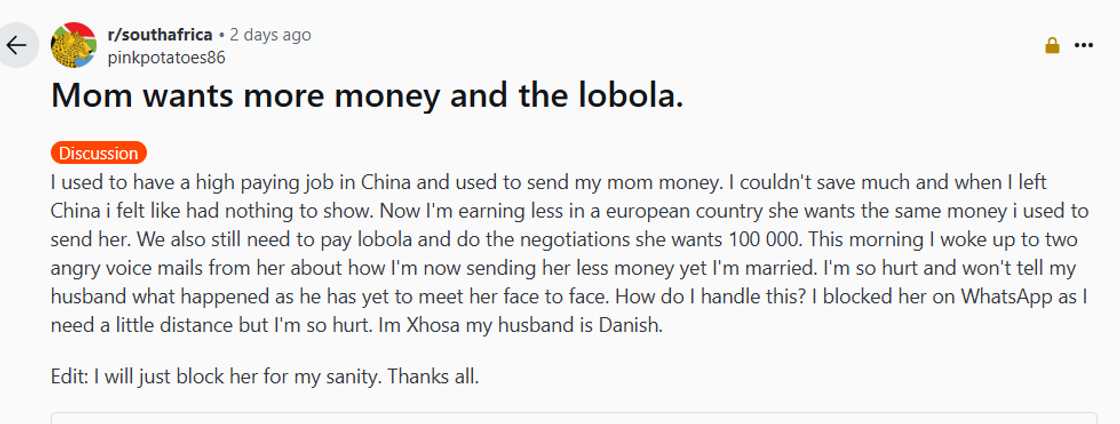“Stop Sending Money”: Woman’s Danish Husband Faces R100K Lobola Demand From Her Mom, SA Stunned
- A South African woman abroad faced significant financial pressure from her mother, demanding high contributions despite her reduced earnings
- The personal dilemma, posted on Reddit, detailed her ongoing struggle to meet her familial expectations, including a substantial lobola demand for her upcoming marriage
- Social media users responded with strong advice, urging her to set boundaries with her mother and to critically re-evaluate the concept of lobola
- Briefly News spoke with Mkhulu Thobile, a local traditional healer, to get his expert take on a cultural dilemma

Source: Getty Images
A candid online post shed light on the complex challenges faced by individuals supporting family back home, especially when cultural traditions like lobola are involved.
The emotional account, shared on Reddit by user @pinkpotaties86, prompted considerable discussion among social media users.
The woman, who previously earned a high salary while working in China, regularly sent money to her mother in South Africa. She, however, found it difficult to save much for herself during that period. Upon her eventual departure from China, she felt she had little tangible wealth to show for her time there. Currently, she earns less money in a European country, yet her mother still expects the same substantial amount she had previously sent.

Read also
A woman used her first education assistant salary to surprise her mother and make her day special
A daughter's dilemma
Adding to this financial strain, the woman and her Danish husband are preparing for lobola negotiations, a traditional Southern African marriage custom. Her Xhosa mother is now demanding R100,000 for this customary payment. On a recent morning, the woman woke to two angry voicemails from her mother, expressing profound frustration that she was sending less money, particularly now that she was married, implying a heightened expectation of support.
PAY ATTENTION: stay informed and follow us on Google News!

Source: Getty Images
Navigating tradition and family
We at Briefly News spoke with local traditional healer Mkhulu Thobile to gain his wise counsel on a situation where a Xhosa mother demanded a large sum of money for lobola.
The team asked the sangoma what the traditional custom is regarding a mother's role in lobola negotiations. He said:
"It is very important to understand that in our Xhosa custom, a woman, especially a mother, does not negotiate or decide on the final amount. That responsibility is traditionally carried by the father and uncles. They are the ones who sit down with the family of the groom and come to a respectful agreement. The mother's role is to share her feelings and desires with the men of the family, but the final decision is not hers to make."
We asked what, in his view, is the true traditional purpose of lobola. The man responded:
"Lobola is not a payment for a woman or a source of profit. It is a sacred process to show respect and to build a bridge between two families. It is a way of showing that the groom appreciates the family for raising a beautiful daughter, and proof that he will be able to take care of her. It is meant to be a unifying gesture, not a financial burden that creates hardship and conflict between people.
When asked how the family should navigate traditional customs like lobola with a spouse from a different cultural background, like the Danish man in the article. The traditional healer said:
"Culture should not be a barrier; it should be a way to teach and share. The family must approach this with an open heart. They should explain the meaning behind the lobola custom to the Danish man so that he understands that it is a sign of respect and unity. The true purpose of loboma is to bring people together, not to push them apart with high financial demands."

Read also
21-Year-old South African woman builds own apartment from scratch, inspires Mzansi with her journey
SA offers advice
The post gained floods of comments from social media users who offered a range of advice and perspectives. Many users strongly advised the woman to establish a clear distance from her mother, expressing concern that relentless financial demands could potentially ruin her marriage and personal life.
Some urged @pinkpotatoes86 to draw a firm line and not allow her mother to manipulate her, asserting that it was the mother's fundamental right to raise her daughter without such later financial burdens. A significant portion of the discussion shifted to the concept of lobola itself. Others debated its relevance in contemporary society, arguing that the practice needs re-examination as it no longer serves all individuals in this day and age.
User @kevvy_dawg
"Lol, if you feel bad for not paying her more money, then I don't feel bad for you. Just stop sending money and enjoy your money."
User @Playful-Decision5736
"I seem to be going against the grain here. Looking after our parents is what makes us who we are. The South African sense of community. My advice is to send her money, but state the amount that you are sending and stick to it. Almost dictate, this is the amount I will be sending, and there is no negotiation. With regards to lobola, it’s up to you if you want to maintain a cultural norm. Benchmark a reasonable amount that you and your husband are comfortable with, and again state that this is the amount that will be given. Do not negotiate, but also do not lose your culture based on your mom's greed."

Read also
"May this inspire others": Domestic worker with viral business gives back to community, SA moved
User @jaded_dahlia
"The concept of lobola in this day and age is crazy."
User @Zealousideal_Mail12
"Please block her"
User @AdeptWelder3250
"Everyone is saying draw the line for that. I’d do it all to give back for the life my moms and grandparents gave me. Set a boundary, yes, but don’t cut your moms off completely from communication. If you don’t want to send money, given that your husband has said his reparations, then let it be known you want to enjoy the emotional and communicational relationship with her, but don’t outright cut her off."
User @usuallyrainy
"R100k for lobola is crazy, and I think especially for expecting a foreign husband to pay that when it's not part of his customs. When lobola is used to help pay for the wedding, it makes sense, but otherwise it can become a scam."
See the Reddit post below:

Source: UGC
3 Briefly News articles about lobola

Read also
"I can keep going": A Joburg housewife shows her soft life in Japan that has Mzansi drooling
- A woman impressed online community members by sharing a video of her kneeling while serving her man food during her lobola negotiation.
- A local family put much effort into preparing food for their daughter's in-laws, who were meant to arrive for the lobola negotiation, but the man's family never arrived.
- A happy lady shared a video of four men counting bank notes, mostly R100 and R200, and putting them in stashes of R1000 during her lobola negotiation.
PAY ATTENTION: Follow Briefly News on Twitter and never miss the hottest topics! Find us at @brieflyza!
Proofreading by Kelly Lippke, copy editor at Briefly.co.za.
Source: Briefly News


